Today I tried to print thing 27405 from thingiverse (http://www.thingiverse.com/thing:27405) on the PrusaMendel in the CCCZH lab.
The result is shown in the provided image.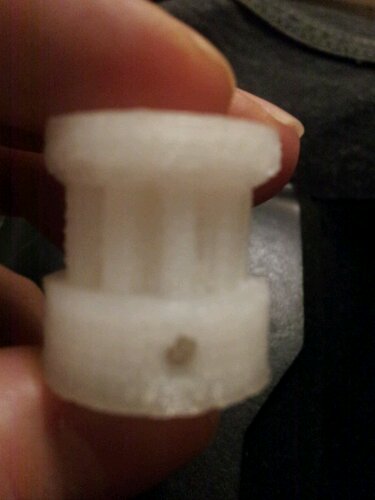
After some tweaking of temperatures and speed I finally managed to make it print perfectly!
While bigger objects still are producing some strings when it’s going to the end, smaller objects are printing fine now.
Turning the temperature to 190°C for the first layer and 185°C for all the other layers, and also reducing the extruder multiplier down to 1.0 made all problems go away. Finally!
Now I just have to figure out how to make Slic3r in ReplicatorG do support material.
Success
 I actually wasn’t sure if the RepRap wasn’t gonna burn like hell while being left alone printing in the hackerspace but it made it’s job well and printed the whole Hilbert-Knot without any incident.
I actually wasn’t sure if the RepRap wasn’t gonna burn like hell while being left alone printing in the hackerspace but it made it’s job well and printed the whole Hilbert-Knot without any incident.
During my trip to the hackerspace I already had nightmare imaginations of what might have happened to the machine.
I was quite delighted to find out that none of them had happened.
On the contrary: I now even have figured out the optimum feedrates needed to print overhanging objects which are enough dense.
I think I’ll try to print a rainbow dash soon.
Ha! It prints :-)
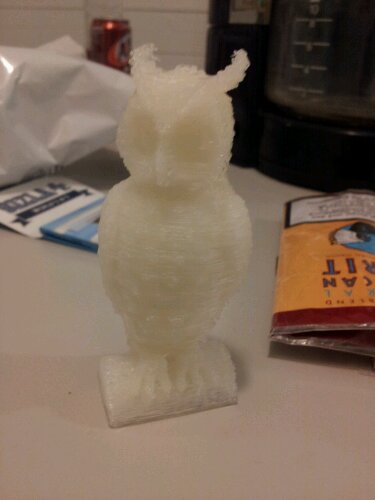
Spinning is so much cooler than not spinning
Since I’m already thinking about some new tinkering projects for the post
RepRap era I stumbled upon the following nice experiment.
Since the linearization of Einstein’s space-time-metrics depends on the assumption that the distortions are quite small,
there went up criticism from certain members from the CCC, like Raoul, that such equations could never be used in order
to describe something as a rotating niobium ring (Like in this experiment).
The measurements taken seem to support Raoul’s argumentation.
Being a factor 20 off the calculations shows us wonderfully that assuming a non-linear system to be linear
only works when the numbers you’re crunching aren’t that big, otherwise you miss some values…
But remarkably: The measured values were 20 times bigger then predicted, which means,
that you can actually get more power out of the system then you’d expected.
Which means, these measurements mean: The idea of antigravity isn’t as brain damaged as some may think…
Only: the problem is now the same as it is with the electric rockets…
What’s moving an electron within an B-field, it’s the Lorentz force, but this one is damn weak.
And also the Lorentz force doesn’t actually move an electron into an opposite direction,
it usually just pushes it a little in it’s already existing trajectory…
Same for the gravito magnetic Lorentz force.
Seems as the laws of physics will still stay a bitch for a while.
But the experiment is still a cool idea, or as General Hammond would say: “Spinning is so much cooler than not spinning”
Contact
Howdy
During my cleanup of comments I found some of them actually NOT to be SPAM but actually relevant questions which I had overlooked before.
For the future: If you’ve got some technical questions, please contact me under the contact informations I added on the “contact” page 🙂
RepRap: Doh!
Today I just found out that typos in your C-Code sometimes can be lethal.
e.g. if you type a 61 instead of a 60 for the maximum number of values in your array,
your µC might just hang and melt down your PEEK heat stopper.
I’ve already ordered a new hot end.
Hopefully it arrives soon.
In the meantime I’ll optimize the way, R2C2-Firmware manages the heating.
Because there are more efficient and stable ways to do so…
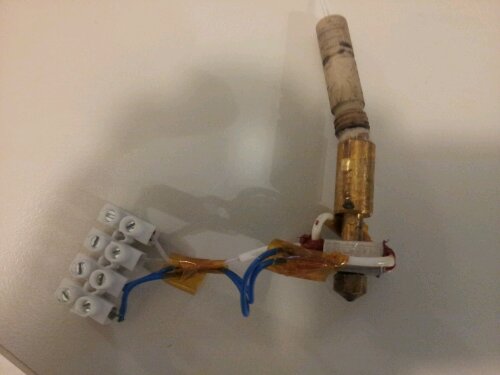
Origami dragon

Thermistor take 2
Ok. The following information can be taken out of the R2C2 schematics from BitBox:
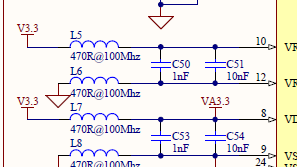
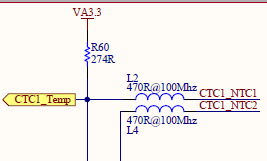
http://ftp.o2s.ch/RepRap_BitBox_Wolfgang/calculus3.html
With this calibration and connecting the two power resistors into series it now shouldn’t start smoking anymore.
Well. At least as long as you prevent Ari from turning the heat onto 240°C again >_>
BitBox R2C2 electronics with Wolfgang’s hotend
In our CCCZH laboratory we are using the R2C2-Electronics from BitBox now.
The hotend is made by Wolfgang from reprap-fab.org.
First run. Uh! Oh! It’s smoking.
We had to drill and poke the PLA out of the PEEK.
What had happened?
Well. Math happened 🙂
http://ftp.o2s.ch/RepRap_BitBox_Wolfgang/calculus2.html
The Bitboxers obviously dimensioned their serial resistor for another thermistor.
Wolfgang is using the B57560G104F in his hotend.
So with a 10kΩ resistor in series the voltage on the ADC will look like that:

While basically it should look like that (with R1=500Ω):

Or in short: Let’s get the soldering iron again >.<
The C-Code will then look like that:
/* {ADC value Extruder0, ADC value HeatedBed0, temperature} */
uint16_t temptable[NUMTEMPS][3] = {
{950, 60, 300},
{1552, 95, 248},
{1891, 119, 226},
{2380, 215, 198},
{2653, 293, 183},
{3006, 447, 163},
{3294, 641, 145},
{3488, 865, 131},
{3765, 1408, 105},
{3901, 1906, 86},
{3999, 2732, 64},
{4053, 3352, 42},
{4077, 3755, 22},
{4089, 4085, 0}
};
PlasmaMobile & ARMv7
Usually, hand held devices are based, so you’d expect the Meego and openSuSe people to build for this platform…
Yeah… One _would_, but just would… -.-
EDIT:
There we go…
http://download.opensuse.org/repositories/home:/mayerjosua:/GTA04:/plasmaactive/openSUSE_12.2/armv7hl/